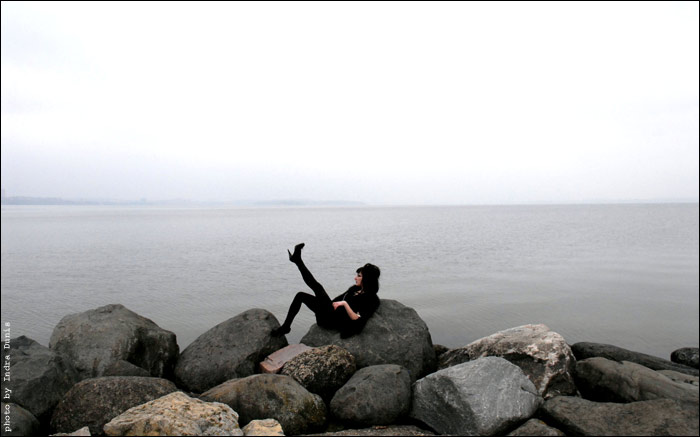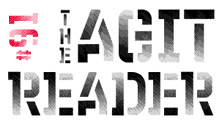
A New Testament
by Stephen Slaybaugh
When Zola Jesus emerged two years ago as the author of a couple singles combining a steely mix of blackened aesthetics and white noise atmosphere, the nom de plume of Nika Roza Danilova immediately demanded attention. At the center of this darkened din was Nika’s voice, which, when she was younger, had been trainied for opera. While Zola Jesus may have shared some of her original pursuit’s heightened emotion, the project pulled from a breadth of pre- and post-punk idioms to create something distinctly modern. EPs for Troubleman and Sacred Bones followed, but her unique sound seemingly came to fruition with last year’s full-length, The Spoils, wherein Nika’s self-made sonic world canvassed 15 tracks and revealed its true depths.
This month Zola Jesus released another EP for Sacred Bones, Stridulum, which shows the artist expanding her repertoire. Gone is some of textural obfuscation of her past work. Instead, Nika has created songs that ring with certain clarity, but that are no less emotionally haunted or stirring.
I caught up on the phone with Nika, who was in Los Angeles a few days before a show to look at apartments, as she plans to move there later this year.
Do you consider Zola Jesus a stage persona, a band or something else? I mean, should I be calling you Zola?
Nika Roza Danilova: You can, but you can call me Nika too. It’s just a name under which I make my music, but it’s kind of become all-encompassing. So you can call me either, but it’s definitely a singular persona. It’s not a full band.
You’ve described wanting to make music that’s an honest reflection of yourself, so is there any separation between yourself as a person, as Nika, and Zola Jesus?
NRD: Not necessarily. I think of Zola Jesus as an outlet for my creative pursuits. It’s a way to categorize it. I don’t believe in putting on an act, so it’s a true reflection of myself as a person and what I want to explore artistically.
It sounds like you grew up in a fairly isolated locale.
NRD: Yeah, I grew up in northern Wisconsin on a 100 acres of wooded forest.
Were you exposed to pop music? Did you have access to that sort of thing if you are out in the middle of nowhere?
NRD: Yeah. We didn’t have MTV, but we had radio. I listened to the radio so I was familiar with the pop music of the time. But I wasn’t completely surrounded by it or absorbed into that culture because I didn’t live in an area where pop culture was driving society like it does in a bigger city, like New York or Chicago, where it’s all around you.
So how does one go from making music on your own in the middle of nowhere to putting out records?
NRD: I have no idea how it happened to be honest! That was really empowering when it did happen. I’m living in Madison, which is not necessarily a small town, but it’s not a big town, and it’s not like you have many opportunities to get your music out into an international market. But I think in this day and age, it’s a lot less important where you live because things are so global. I think I’m a success story for the technology that’s in the world right now.
When most people describe your music they use terms like “goth” or other pop music points of reference. But given your background, are their influences that most people aren’t getting?
NRD: I was just having a conversation with my boyfriend about this. The whole taxonomy of music these days is so overwhelming. I think it’s really alienating for a lot of musicians. Being called “goth” or anything like that just puts someone in a box to be sold at Hot Topic, and it means that you’re trying to emulate something that’s been done before. That bothers me because it’s really regressive as an artist to say “I’m making minimal synth-goth darkwave pop lo-fi.” Everyone has influences and you come from somewhere—I’m not saying I came from the moon—but with my influences I’m trying to create something new. I mean, I listen to all sorts of things—from early electronic music to industrial to pop music to R&B—and it all plays a part in making Zola Jesus what it is. So to call it one thing is limiting.
Do you sing differently as Zola Jesus than performing an opera, other than not singing in Italian?
NRD: I use a different voice to sing opera. I’m a soprano so I use my soprano head voice, and when I do Zola Jesus I use my chest voice. Growing up I always had a problem with how I sang and I couldn’t really get over it. I don’t know if I’ve just learned to sing differently, but it was always a roadblock in developing and adapting that voice. When you are learning opera, they want to teach you to sing in one voice. It’s very uniform and very scientific, and if you don’t have that voice then you are not successful as an opera singer. When I was learning opera, I didn’t have that voice so I had to kind of go around the block to learn how to sing. Everyone has a different voice and a lot of it is just what you are born with. I always had a distinctive voice that wasn’t necessarily fit for opera, but I tried and I worked and did the best that I could and I succeeded regardless.
Is the opera something that you pursue at all anymore?
NRD: I haven’t studied opera in awhile. I gave up on it when I was about 16 because I was really frustrated about having to criticize everything about my voice. It gives you a lot of anxiety because it’s a skill, but if you are playing an instrument, you can practice until you die and can become, say, the best guitar player. But with your voice, you’re born a certain way and to criticize it... it gave me a lot of anxiety and I became depressed so I had to give it up. But I’d love to sing opera again and take up my studies.
It’s kind of a silly question, but do you see rock opera as a viable form?
NRD: I don’t think so. The most successful modern opera I’ve seen is that one the Knife did, Tomorrow, In a Year. That is something that I really respect. It’s not necessarily rock opera, but growing up I always wanted to be that blue chick in The Fifth Element.
I read that you look at each album as a whole and not just a collection of songs. But given that some of the singles appeared on the album, do you look at all your work as pieces of a larger thing?
NRD: Yeah, definitely. It’s not necessarily coherent, because every record I’m trying something different, but I think if you put it all together, it’s like a biography or something. Not to be all heady about it, but you can see how I’ve grown and developed and tried out different things. In that sense, it’s very coherent, but aesthetically, I think it’s going to continue to change and evolve. There’s a thread, though, that ties it all together in the end. It’s always honest and has the same themes.
In another thing I read, you described yourself as being self-critical. Now that you know people are listening, are you more self-critical or has it given you more confidence?
NRD: I don’t think I will get confidence for a long time. I think it’s just made me more self-critical. I feel like no matter what I do, it’s never good enough and I’m just going to continue to try to make the perfect thing. So yeah, I think it’s just made it worse, but I think that’s good. I’m more productive that way.
How do you reconcile those perfectionist tendencies with working in the lo-fi vernacular that some of your records have?
NRD: I really like the sounds of lower quality recordings because in the production you create a new sound. I really like industrial music and noise music, and to me, that’s the closest I could get to making noise. No matter how hard I try, I fail at power electronics and industrial music. I’m a singer and a pop musician so for me that gets as close to that while still pulling something off. That texture—that grinding lo-fi sound—I love it a lot. Even if I’m going to clean up my recordings it’s something that will peak through.
Yeah, it seems like there’s a give and take between the noisier stuff and the more melodic elements of your music. Is creating that kind of tension something you do very deliberately?
NRD: I really love pop music and I really love noise, so trying to find a balance is difficult. Like on The Spoils, my interest in industrial music won over. It’s not an industrial album, but it won over on that side of the balance. And for Stridulum, the pop is coming out. I try to find a balance and whatever comes out, comes out.
In the press sheet for the new EP, it says that your vocals were recorded with “professional instruments.” Was there a new approach to the whole thing or was it a matter of just recording the vocals in a studio or something?
NRD: It was still done in my bedroom. My friend Alex DeGroot, who’s now a part of my live band, went to school for audio engineering and is very talented. He came over and I recorded my vocals with him on his gear.
You said that you thought it was a less noisy record and that the pop side won out. Was that something you were going for or was it just a matter of having this other gear at your disposal?
NRD: It was definitely intentional—the songs didn’t write themselves. I wanted to make pop music and I wanted to reach out to people and write music that people can relate to and chord progressions that hit them right away. With the lo-fi stuff, it was inaccessible, which is fine because I don’t think it should be easy to listen to music. That’s why I don’t write songs about the beach and smoking weed. Everything has to be a challenge in life, otherwise you’re not progressing as an individual or as a race. But this time, I wanted to make something that challenged people emotionally instead of audibly. I really enjoy that and I think that’s what I’m going to do for a little bit because I don’t feel done yet.
Obviously, you just put this record out, but are you working on something else?
NRD: I’m still doing promotion and touring for Stridulum, but I’m going to start working in April or May on the next album.
Are you the type of person who is always writing songs or is it something you sit down and do purposefully?
NRD: Yeah, I need to have a lot of focus because I’m in school full-time and I don’t have much time to write or record music. But given the opportunity, I’m always at my keyboard. Having the goal of writing an album, though, because it is such a piece of work and such a concept with all the songs linking together, if I write one song, I’m writing all 12 songs.
